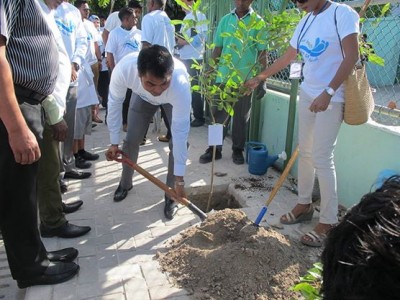Economic development and protection of the environment should go in tandem to ensure sustainable development, President Abdulla Yameen has said.
In a message on the occasion of World Environment Day, President Yameen said the Maldives’ environment and ecosystems have been adversely affected by some development efforts.
“Therefore, we have to pay more attention to this. And we have to ensure that development and protection and sustenance of the environment go together. That is how sustainable development can be achieved,” he said.
“Doubtless the development that all our citizens want is intertwined with this.”
The current administration has come under fire from local environmental groups following environmental damage caused by a US$37 million four-island reclamation project carried out by Royal Boskalis Westminster.
The Netherlands-based maritime infrastructure company was accused of mining sand from the country’s only UNESCO biosphere reserve in Baa Atoll as well as failing to build a barrier to prevent excess dredge soil from spilling onto the reef in Baa Atoll Eydhaushi Island.
In the two islands where reclamation was completed, houses and vegetation on the shorelines were also covered in fine mixture of sand and salt due to the use of the “rainbow technique” which propels soil into the air.
Climate change
President Yameen meanwhile referred to the findings of the second working group of the Intergovernmental Panel on Climate Change (IPCC) and called for timely action to address climate change.
“The quantity and quality of water resources are being affected. Climate change is negatively impacting crop yields as well. Impacts from recent climate-related extremes reveal significant vulnerabilities and expose some ecosystems and many human systems to current climate vulnerability,” Yameen said.
“At the forefront of those facing the effects of climate change are communities living in the world’s low-lying regions and small island states.”
Referring to the theme of this year’s Environment Day – “Raise Your Voice, Not the Sea Level” – President Yameen welcomed the special focus which will be afforded to small island nation states such as the Maldives.
The president noted that the United Nations has designated 2014 as the International Year of Small Island Developing States (SIDs).
Yameen also paid tribute to the climate change advocacy efforts of of former President Maumoon Abdul Gayoom, who he said brought the threats posed by sea level rise to global attention in the late 1980s.
Foreign Minister Dunya Maumoon also emphasised the need to take concrete action to avert climate catastrophe.
A Foreign Ministry press release today said that the minister expressed hope that key international conferences this year would successfully take into account the vulnerability of SIDs.
The Third International Conference on Small Island Developing States will be held in Samoa in September, while the negotiations of a new climate treaty at the Meetings of States Parties of the UNFCCC will also take place in 2014, detailed the release.
The press statement noted that the IPCC’s latest report has “proven that climate change is neither just an environmental issue nor a scientific thesis, but is of a question of the survival of each and every nation around the planet, irrespective of its size.”
“The minister also reiterated that the Maldives continues to be in the front line while refusing to remain a victim, and have been an agent of change in addressing environmental issues,” it added.
“The Maldives is currently in the process of developing a low carbon development strategy which paints a promising picture not only for the nation but the world. Internationally, the Maldives has led efforts to emphasise the links between human rights and climate change, as well as the plight of small states.”
 In his message, Environment Minister Thoriq Ibrahim meanwhile noted that 23 percent of the Maldives’ GDP was spent on importing fossil fuels and stressed the importance of developing sources of renewable energy.
In his message, Environment Minister Thoriq Ibrahim meanwhile noted that 23 percent of the Maldives’ GDP was spent on importing fossil fuels and stressed the importance of developing sources of renewable energy.
The Environment Ministry commenced its programme to mark the World Environment Day with a tree planting event in front of the Male’ Sports Complex.
Other events planned by the ministry include the publication of reports for energy saving in schools, a photography exhibition, a film festival, and a clean up event in Malé.
 “We’ve seen incredibly creative actions in the Maldives by grassroots activists fighting climate change too and with such international concern for the political situation there, similar tactics could be employed at the current time with great effect,” he added.
“We’ve seen incredibly creative actions in the Maldives by grassroots activists fighting climate change too and with such international concern for the political situation there, similar tactics could be employed at the current time with great effect,” he added.